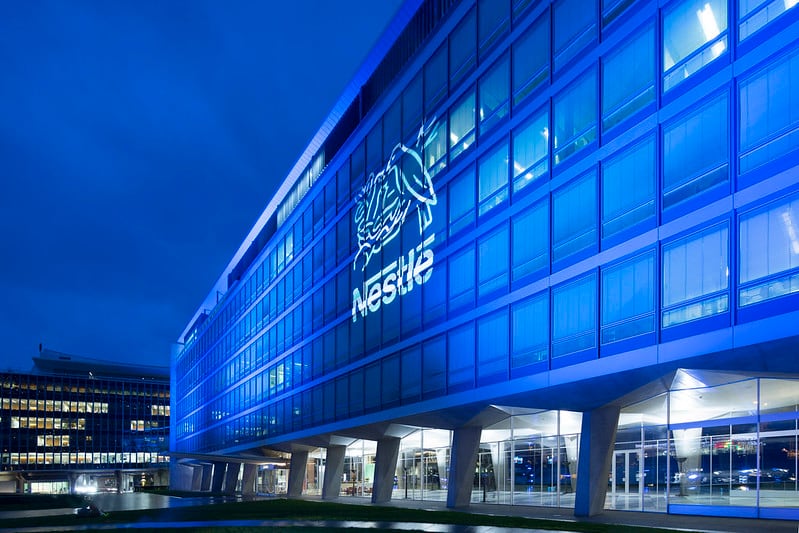What happened at Nestlé? Investor-focused summary of CEO scandal
- CEO Laurent Freixe was fired for breaching Nestlé’s conduct rules
- Anonymous tip revealed romantic relationship with a direct subordinate
- Nestlé shares dropped 2% following leadership scandal announcement
- Investors fear strategic drift and governance instability at Nestlé
- New CEO Philipp Navratil appointed quickly without external candidate search
Last Monday brought the shocking news that Nestlé had fired CEO Laurent Freixe after just 12 months in the job.
The shamed CEO, it said, was ousted following, “an undisclosed romantic relationship with a direct subordinate which breached Nestlé’s Code of Business Conduct“.
Naturally, this news sent the media into a frenzy to discover the secrets behind the carefully worded statement, and the Wall Street Journal got the scoop, revealing Freixe’s removal followed an anonymous tip to Nestlé’s internal hotline, ‘Speak Up’. The whistleblower claimed Freixe was conducting a relationship with a marketing executive, who was also receiving preferential treatment in the workplace.
The pair are said to have denied any relationship when questioned during the first of two separate investigations, but further hotline reports ultimately led to the CEO’s demise and left his professional reputation in tatters.
So where does this leave Nestlé’s reputation? The multinational has now said goodbye to two CEOs in as many years, leaving investors rattled.
Nestlé investor trust falters
“Nestlé has always traded on its reputation as the steady hand in global food and beverage,” says Nandini Roy Choudhury, principal consultant for food and beverage at analytics group Future Market Insights. “It was seen as the embodiment of consistency - blue-chip, dividend-paying, with a broad portfolio designed to withstand economic cycles.”
All this means the current leadership turmoil is especially damaging.
Investors, says Choudhury, expect disruption in fast-moving tech stocks or volatile energy markets, but when the world’s largest packaged food company cycles through two chief executives in under twelve months, alarm bells ring loudly.
In fact, so loudly that Nestlé’s share price immediately dropped 2% in the wake of the news, as the markets reacted to the chaos.
And while Nestlé sought to steady the ship immediately - confirming Philipp Navratil as leader - the reputational damage had already been done.
“Investor confidence is shaped as much by perception as by fundamentals,” says Choudhury. “For Nestlé, the perception is one of drift. The repeated CEO changes have left markets with the impression of a company searching for direction, unable to align its board, management, and shareholders on a coherent strategy. This uncertainty is toxic for valuation.”
What’s more, this comes at a time when Nestlé is already struggling with a declining share price.
Nestlé‘s long-term decline
“Shares have declined nearly 30% over five years, and that steady erosion, combined with the latest intraday drop after the CEO’s dismissal, underscores how investors are voting with their feet,” says Future Market Insights’ Choudhury.
And this decline is not just about short-term earnings, it reflects investor doubt in Nestlé’s ability to deliver sustained growth, manage its large portfolio, and execute in an environment of rising costs and fierce competition.
Moreover, says Choudhury, this confidence erosion will only serve to widen the gap between Nestlé and its peers.
“While Danone and Unilever have also faced activist pressure and restructuring, their challenges have been gradual and predictable,” she explains. “Nestlé’s situation feels chaotic. The sudden CEO exits project a sense of crisis management rather than forward planning. For long-term institutional investors, who prize predictability and dividend security, this volatility is unacceptable. It also invites activists to push for further radical restructuring.”
Ultimately, says Choudhury, instability affects valuation through two channels - higher perceived risk and lower expected growth. Risk-averse investors demand a discount on Nestlé shares, while doubts about management’s ability to execute lead to more modest growth assumptions in analyst models. Together, this drives sustained underperformance relative to benchmarks.
Unless Nestlé can demonstrate a period of stable leadership and a credible roadmap for portfolio optimisation and margin recovery, Choudhury warns that the selloff is likely to continue.
Was Freixe’s replacement decided too quickly?
Nestlé‘s decision to announce Laurent Freixe‘s replacement in the same breath as they announced his departure is understandable - the company clearly wanted to display continuity and constancy. But was the decision to appoint Philipp Navratil taken too quickly? And why was an external search for the new CEO not conducted?
“The appointment of Philipp Navratil as Nestlé’s new CEO, without a rigorous external search, is a double-edged sword,” says Future Market Insights’ Choudhury. “On one hand, it provides continuity and ensures a swift leadership handover, minimising disruption. On the other, it risks reinforcing the perception that Nestlé is trapped in an echo chamber, recycling internal leaders rather than injecting the fresh thinking investors increasingly demand.”
The absence of a broad search implies urgency, and potentially even desperation, to fill the top job quickly.
However, a Nestlé spokesperson insisted this is not the case, saying, “Nestlé has a well-defined succession management process, and we proceed in accordance with those procedures. Philipp Navratil was identified as a top talent and future CEO as part of that process.”
Navratil’s background at Nespresso brings operational credibility, but not necessarily the transformational vision Nestlé now requires.
“He’s a pragmatic insider, familiar with the company’s processes and culture, but continuity is not what the market is clamouring for,” says Future Market Insights’ Choudhury. “Shareholders wanted bold leadership to address stagnating sales, margin pressures, and a bloated portfolio. By appointing from within, Nestlé risks signaling that it intends to manage decline rather than pursue radical reinvention.”
There are also cultural implications, explains Choudhury. Nestlé’s sprawling portfolio - from coffee to water, infant nutrition to pet care - requires a leader with global perspective and the courage to challenge the status quo.
“Insiders can sometimes be constrained by loyalty to legacy businesses and established structures,” says Choudhury. “A fresh external perspective could have forced the organisation to rethink its priorities and confront inefficiencies more directly.”
Though Choudhury also acknowledges that appointing an outsider does come with its own set of risks, including culture clashes, slow onboarding, and strategic resets that can alienate staff and delay execution.
“Nestlé has opted for the safer, quicker option, but in doing so, it may have sacrificed the credibility that comes from conducting an exhaustive, transparent search,” says Choudhury. “For investors already skeptical about governance, this looks like another missed opportunity to signal boldness.”
What does the future hold for Nestlé?
The long-term market impact of the recent scandal will depend heavily on Navratil’s first 100 days in the post.
If he uses his insider knowledge to accelerate restructuring, cut underperforming businesses, and demonstrate urgency, he could win credibility, despite the limited search.
However, if his tenure is defined by incrementalism, investors will see the appointment as emblematic of Nestlé’s reluctance to embrace change.





